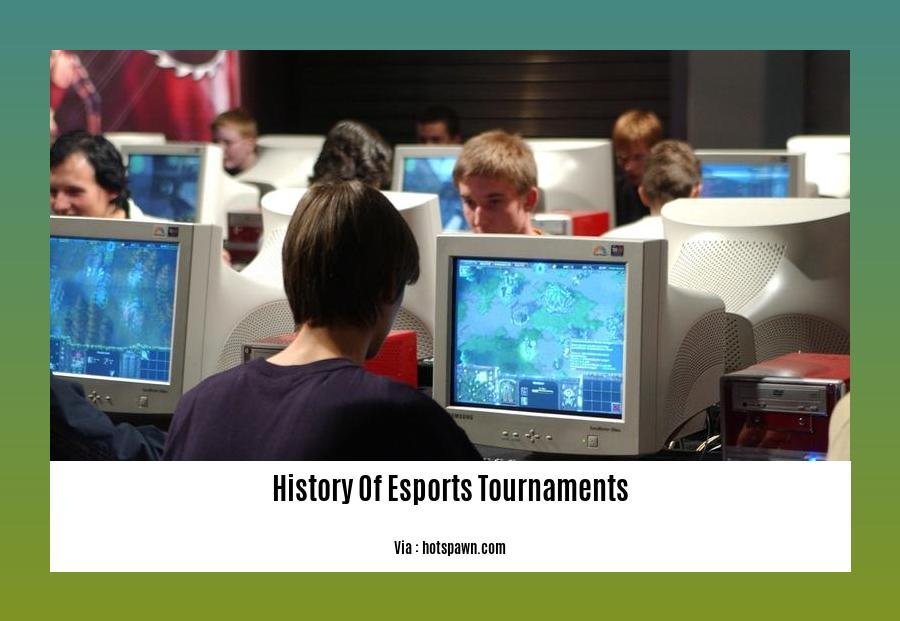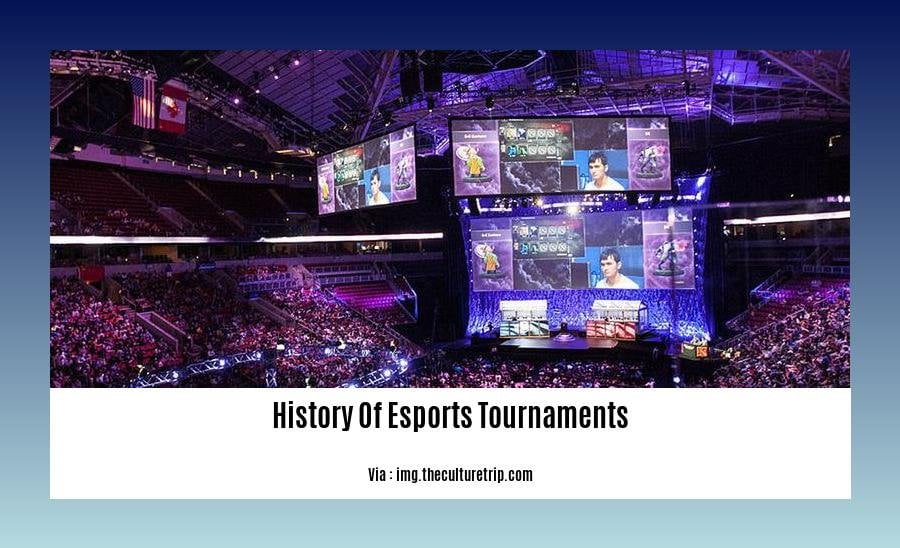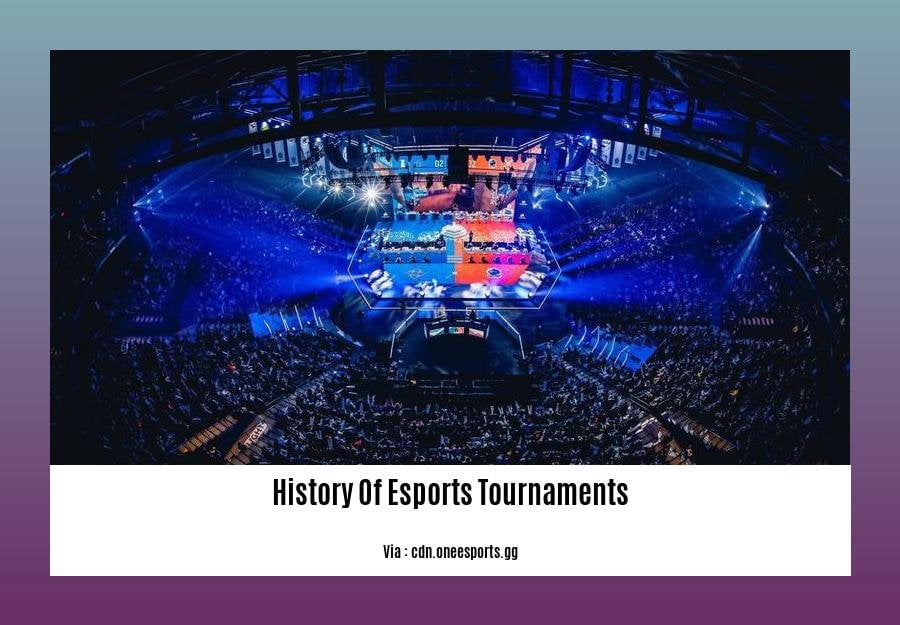From the humble beginnings of LAN parties to the modern-day multi-million-dollar tournaments, the history of esports tournaments is a fascinating journey that has witnessed the evolution of competitive gaming into a global phenomenon. In this article titled [Delving into the History of Esports Tournaments: A Journey Through the Evolution of Competitive Gaming], we’ll explore the origins of esports tournaments, trace their growth through the mainstream breakthrough, and highlight the grand championships that have shaped the industry.
Key Takeaways:
Themed video games in the 1960s laid the foundation for tournament development.
“Intergalactic Spacewar Olympics” in the 1970s marked the inception of esports tournaments globally.
The 1980s brought advancements in gaming technology and the introduction of prize pools in tournaments.
The 1990s saw online tournaments and professional esports team formations due to the internet and PC gaming.
Streaming platforms like Twitch revolutionized esports consumption and popularization in the mid-2010s.
Sponsorships, esports betting, and revenue through media rights and merchandise sales became prominent.
Esports has grown immensely, attracting a vast global audience and generating substantial revenue in recent years.
History of Esports Tournaments

Esports tournaments are a defining aspect of competitive gaming and have evolved significantly since their humble beginnings in the 1960s. Join us as we journey through the key milestones that have shaped the history of these enthralling events.
The Genesis: Birth of Esports Tournaments
In the 1960s, themed video games emerged, sparking the development of tournaments. The first notable tournament, the “Intergalactic Spacewar Olympics,” was hosted at Stanford University in 1972. This event marked the dawn of esports tournaments on a global scale.
1980s: Technological Advancements and Prize Pools
The 1980s ushered in an era of technological advancements that revolutionized gaming. New tournament formats emerged, including the introduction of prize pools. Notable competitions such as the Nintendo World Championships and the Atari Teenage Riot brought esports tournaments into the spotlight.
1990s: Internet, PC Gaming, and Professional Teams
The rise of the Internet and the advent of PC gaming in the 1990s transformed the esports landscape. Online tournaments gained traction, and professional esports teams began to form. Games like Quake and StarCraft became synonymous with competitive gaming, attracting a dedicated fan base.
2000s: Streaming Platforms and Global Popularity
The mid-2010s witnessed the emergence of streaming platforms like Twitch, which revolutionized the way esports was consumed. Streaming platforms enabled millions of viewers worldwide to follow their favorite esports tournaments, propelling the industry to new heights of popularity.
Modern Era: Sponsorships, Betting, and Revenue Growth
In recent years, major companies have begun sponsoring esports teams and events, recognizing the industry’s potential for growth and engagement. Esports betting has also gained traction, further increasing the financial stakes involved in tournaments. The industry has experienced tremendous revenue growth through sponsorships, media rights, and merchandise sales.
Esports tournaments have come a long way since their inception, evolving into global events that attract millions of viewers and generate significant revenue. The history of esports tournaments is a testament to the resilience and adaptability of the gaming community and the enduring appeal of competitive gaming.
Dive into the illustrious History Of Esports Events, where passion and competition intertwine to create epic moments. Travel through time to witness the evolution of Esports from its humble beginnings to the grand spectacles of today. Discover the origins of Esports during the formative History Of Esports era, where innovation and determination shaped the foundation of this global phenomenon. Explore the List Of Esports Tournaments, where legends are made and dreams are realized. Understand the significance of What Are Esports Tournaments, where skill, strategy, and teamwork collide to produce unforgettable matches. Delve into the grandeur of the Biggest Esports Event In History, where the pinnacle of competition unfolds in front of a captivated global audience.
The Mainstream Breakthrough: Esports Tournaments Take Center Stage

Competitive gaming has evolved from humble beginnings to become a global phenomenon, captivating audiences worldwide. Esports tournaments have played a pivotal role in this remarkable journey, transforming esports from a niche pastime into a mainstream spectacle.
Unveiling the Key Moments:
Esports tournaments have undergone a remarkable evolution, marked by several key milestones that propelled them to the forefront of popular culture:
- The Dawn of Online Gaming: The advent of the internet and the proliferation of online gaming platforms in the 1990s provided a fertile ground for esports tournaments to flourish. Online qualifiers and regional finals became the norm, connecting gamers from across the globe in virtual battlegrounds.
- The Streaming Revolution: The rise of streaming platforms like Twitch in the mid-2010s revolutionized the way esports tournaments were consumed. Streaming made esports accessible to a broader audience, allowing fans to witness the action unfold in real-time, creating an immersive and engaging experience.
- The Rise of Professional Teams and Leagues: The establishment of professional esports teams and leagues added a new layer of legitimacy and structure to the industry. These organizations provided stability and support to players, enabling them to focus on honing their skills and competing at the highest level.
- Major Investments and Sponsorships: The growing popularity of esports tournaments attracted significant investments from venture capitalists and traditional sports organizations. Major brands recognized the potential of esports as a marketing platform, leading to lucrative sponsorship deals that further elevated the industry’s profile.
The Impact of Esports Tournaments:
The mainstream breakthrough of esports tournaments has had a profound impact on the industry and popular culture at large:
- Global Recognition and Acceptance: Esports tournaments have garnered global recognition and acceptance as a legitimate form of entertainment. They have captured the attention of mainstream media outlets, broadcasters, and traditional sports fans, breaking down barriers and challenging misconceptions.
- Economic Growth and Job Creation: The explosive growth of esports tournaments has generated substantial economic benefits. Prize pools have reached record-breaking levels, and the industry has created numerous jobs in areas such as event production, streaming, and content creation.
- Cultural Phenomenon: Esports tournaments have become cultural touchstones, drawing vast audiences from diverse backgrounds. They have fostered a sense of community and camaraderie among gamers and fans worldwide, transcending geographical and cultural boundaries.
Conclusion:
The mainstream breakthrough of esports tournaments has been a remarkable journey, transforming esports from a niche hobby into a global phenomenon. Online gaming, streaming platforms, professional teams, major investments, and sponsorships have all contributed to this meteoric rise. Esports tournaments have not only captured the attention of millions of fans but have also generated significant economic benefits and cultural impact. As the industry continues to evolve, esports tournaments will undoubtedly remain at the forefront of competitive gaming, captivating audiences and shaping the future of entertainment.
Key Takeaways:
- The internet and online gaming platforms provided the foundation for the growth of esports tournaments.
- Streaming platforms like Twitch revolutionized the way esports tournaments were consumed, making them accessible to a broader audience.
- The establishment of professional teams and leagues added legitimacy and structure to the esports industry.
- Major investments and sponsorships elevated the profile of esports tournaments and attracted mainstream attention.
- Esports tournaments have gained global recognition and acceptance, becoming a cultural phenomenon and generating substantial economic benefits.
Relevant URL Sources:
Esports History Timeline: Timetoast timelines
(PDF) Esports Research: A Literature Review
The Grand Championships: A Historic Legacy of Esports Excellence
The Grand Championships stand as a testament to the evolution and significance of esports tournaments over the years, showcasing the growth of competitive gaming from humble origins to worldwide recognition. Throughout history, these events have served as battlegrounds where players showcase their skills, forge legacies, and enthrall audiences worldwide.
Key Takeaways:
Esports tournaments have undergone a remarkable transformation, evolving from niche events to global spectacles attracting millions of viewers.
The rise of online gaming and streaming platforms has democratized esports tournaments, enabling gamers worldwide to participate and compete.
Professional teams and leagues have emerged, bringing structure and legitimacy to the industry, allowing players to pursue esports as a viable career path.
Major investments and sponsorships have poured into esports tournaments, attracting traditional sports organizations and major brands, elevating the industry’s profile.
Esports tournaments have gained mainstream recognition and acceptance, captivating diverse audiences and transcending cultural boundaries.
Record-breaking prize pools and economic benefits have stimulated growth and job creation, solidifying esports as a lucrative and sustainable industry.
The Dawn of Online Gaming and the Streaming Revolution:
The advent of the internet and online gaming platforms in the 1990s marked a watershed moment for esports tournaments. Games like Quake and StarCraft captivated players worldwide, creating a fertile ground for competitive events. Platforms like Twitch and YouTube emerged, enabling gamers to broadcast their matches and tournaments, reaching a global audience.
The Rise of Professional Teams and Leagues:
With the growing popularity of esports tournaments, professional teams and leagues began to form, providing structure and legitimacy to the industry. Organizations like Fnatic, Team SoloMid, and Natus Vincere rose to prominence, establishing dominant dynasties in various esports titles. Leagues such as the League of Legends Championship Series (LCS) and the Dota Pro Circuit (DPC) emerged, creating a competitive ecosystem where teams could vie for titles and prize money.
Major Investments and Sponsorships:
The success of esports tournaments attracted investments from venture capitalists and traditional sports organizations. Major brands and corporations recognized the potential of esports as a marketing platform, leading to lucrative sponsorships and partnerships. Companies like Nike, Red Bull, and Mercedes-Benz poured resources into esports tournaments, elevating the industry’s profile and attracting mainstream attention.
Global Recognition and Acceptance:
Esports tournaments gained global recognition and acceptance as a legitimate form of entertainment. Mainstream media outlets began covering esports events, highlighting the skill, dedication, and athleticism of esports players. Major cities worldwide hosted esports tournaments, attracting sold-out crowds and generating significant revenue. Esports became a cultural phenomenon, transcending boundaries and captivating diverse audiences.
Economic Growth and Job Creation:
Esports tournaments have stimulated economic growth and job creation worldwide. Record-breaking prize pools and lucrative sponsorships have generated substantial revenue for players, teams, and tournament organizers. The industry has created jobs in event production, streaming, and content creation, providing opportunities for individuals passionate about esports to pursue careers in the field.
Conclusion:
The Grand Championships encapsulate the remarkable journey of esports tournaments, showcasing the evolution of competitive gaming from niche events to global spectacles. The rise of online gaming, streaming platforms, professional teams, leagues, major investments, and global recognition have transformed esports into a thriving industry. Esports tournaments have captivated audiences worldwide, fostering a sense of community and providing players with a platform to showcase their skills and achieve greatness. As the esports landscape continues to expand and evolve, The Grand Championships remain a symbol of the industry’s rich history and limitless potential.
Citation:
- Esports History: A Timeline of Competitive Gaming
- Esports Research: A Literature Review
FAQ
Q1: When did competitive gaming start?
A1: Competitive gaming began to take shape in the 1960s with the emergence of themed video games and tournaments.
Q2: What was the first esports tournament?
A2: The first video game tournament, called the “Intergalactic Spacewar Olympics,” was held at Stanford University in 1972.
Q3: How did the internet and PC gaming impact esports?
A3: The rise of the internet and PC gaming in the 1990s revolutionized esports by enabling online tournaments and the growth of professional esports teams.
Q4: What are some notable milestones in the history of esports?
A4: Notable milestones in esports history include the introduction of prize pools in the 1980s, the emergence of streaming platforms like Twitch in the mid-2010s, and the establishment of major esports tournaments and leagues with record-breaking prize pools.
Q5: What is the current state of esports?
A5: Esports has become a global phenomenon with dedicated arenas, investments from traditional sports teams, and extensive media coverage. It continues to grow rapidly and attract large audiences.
- SYBAU See You Baby Meaning: Gen Z Slang Evolves - July 1, 2025
- Unlock Your Inner Youth: Lifestyle Secrets for a Vibrant Life - July 1, 2025
- Decode SYBAU Meaning: Gen Z Slang Explained - July 1, 2025






